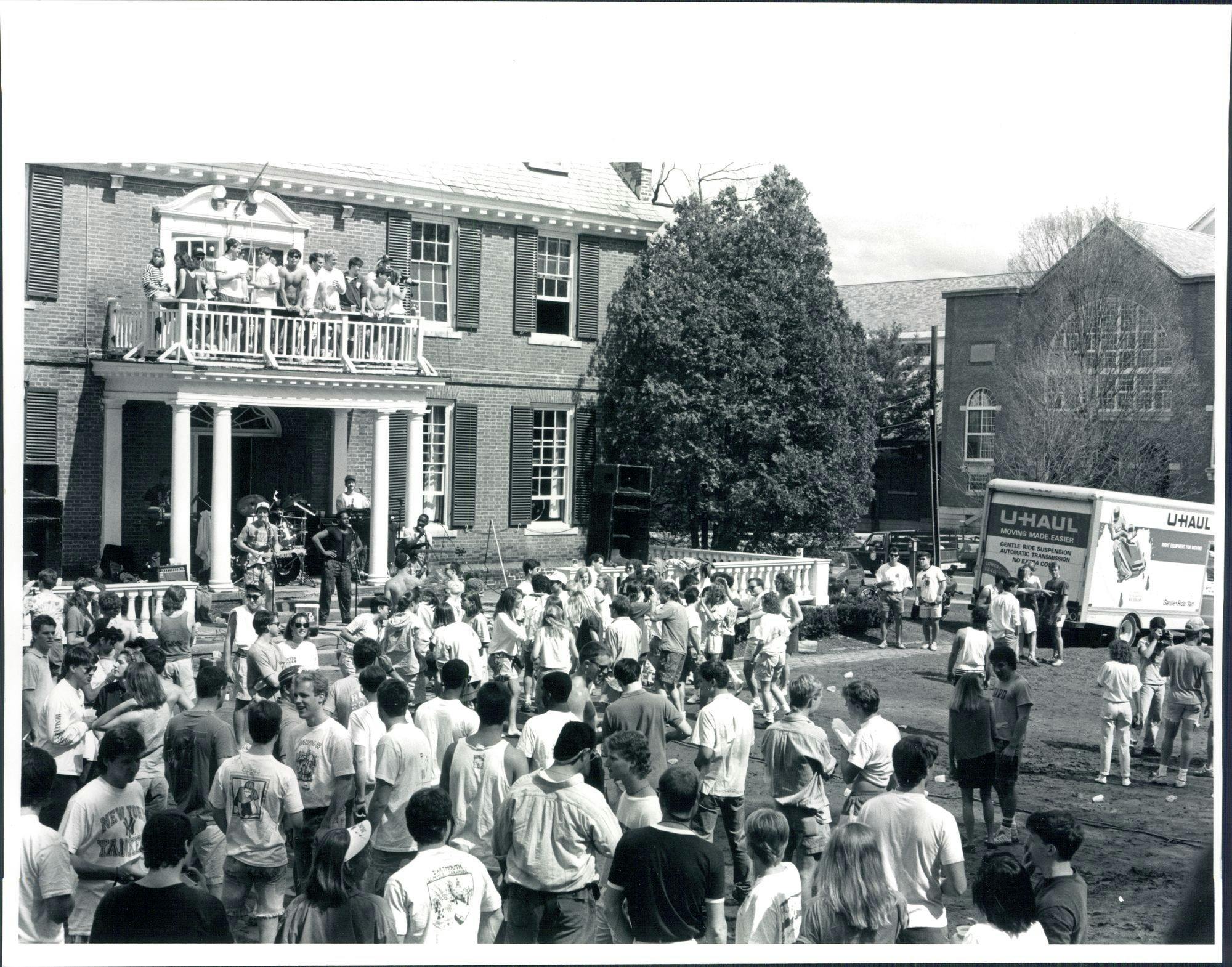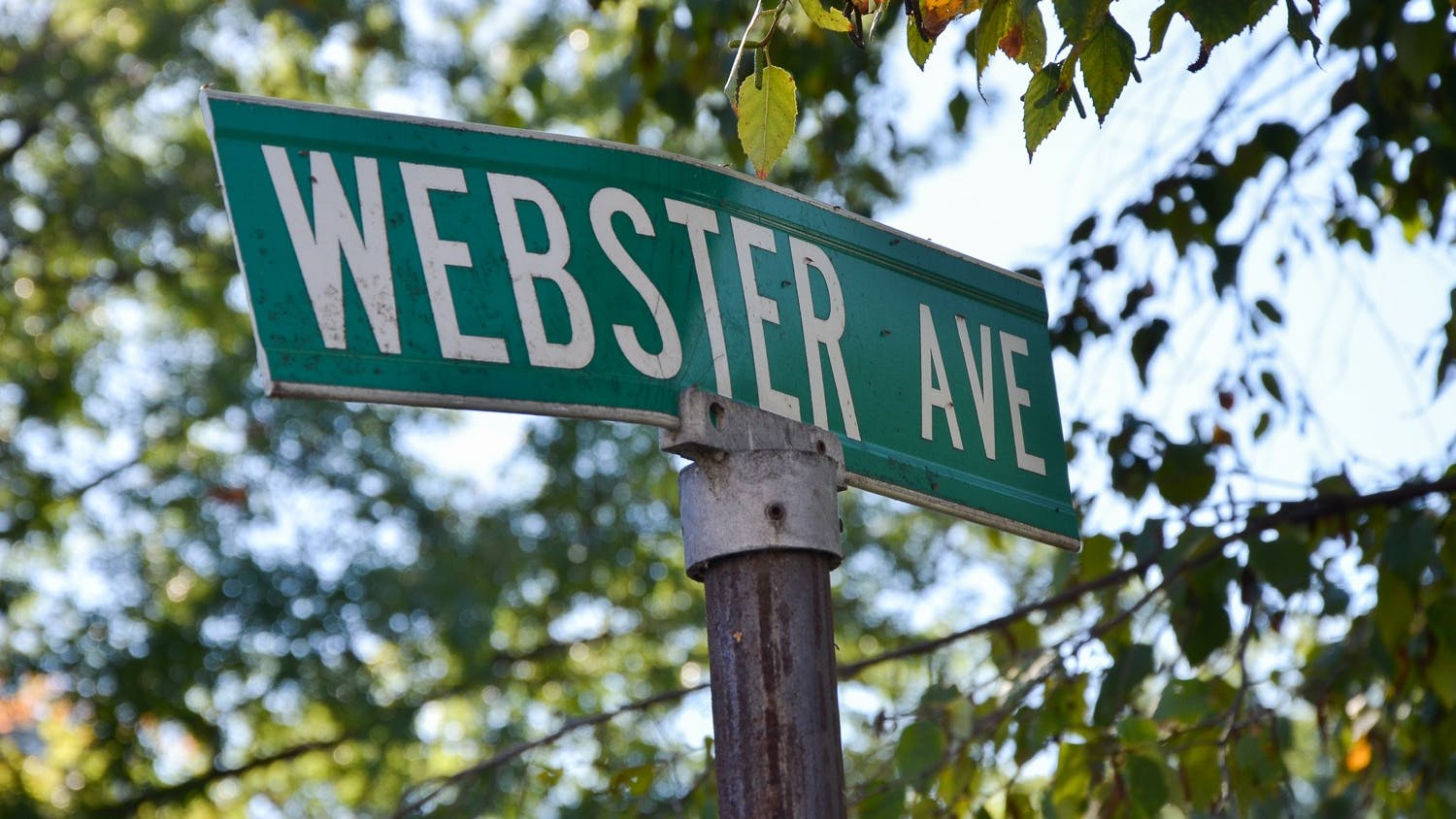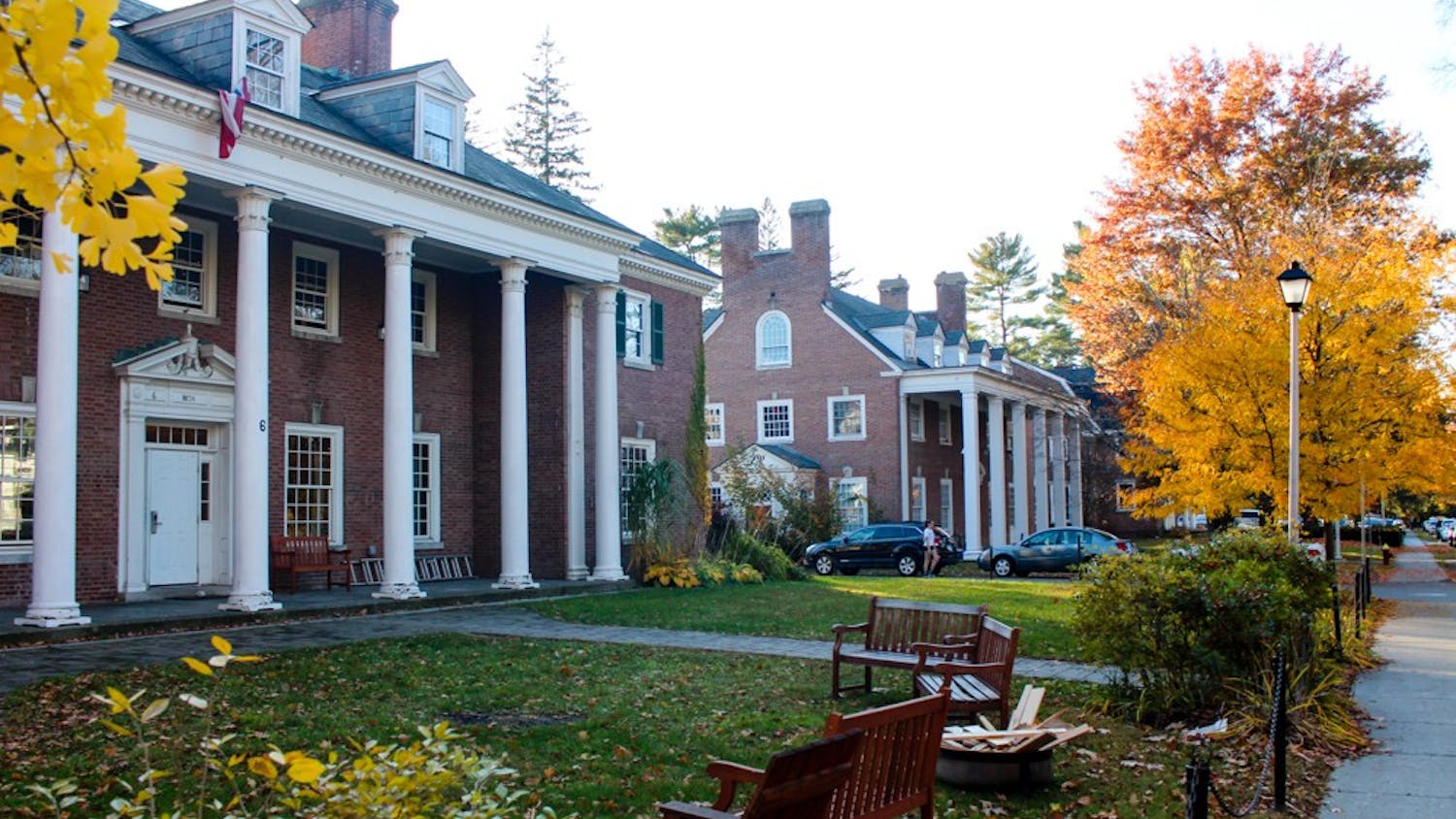This article is featured in the 2021 Winter Carnival special issue.
Derecognition and a hit movie have given Alpha Delta fraternity at Dartmouth a mythic reputation. The house still stands on campus, where it currently serves as office space. But what was it really like to be a part of the brotherhood? According to some of its alumni, it wasn’t exactly like “National Lampoon’s Animal House,” but the film got at least one part spot-on: the music.
Otis Day and the Knights, the fictional-turned-real soul band, said former AD brother and alumni adviser John Engelman ’68, was “the kind of band we would have at AD.”
“Our music was rhythm and blues, Motown, soul music,” Engelman said, as opposed to the “British Invasion” music trend of the late 1960s.
However, the days of parties and musical guests gracing the halls of AD have since passed. With the house derecognized and shuttered in 2015, alumni have been left to reflect on AD’s legacy amid continued campaigns for reinstatement.
House life and history
Dartmouth officially recognized its chapter of the Alpha Delta Phi fraternity in 1846. The chapter was a part of the national fraternity until 1969, when it separated over the issue of expensive dues and became the local fraternity Alpha Delta, complete with a new constitution detailing how the fraternity would run. An archived “Visitors Register” for the fraternity reads across the front “Dartmouth Chapter, Alpha Delta Phi,” with “Phi” crossed out by a single line.
Engelman described the 1960s fraternity landscape as being somewhat different from what it is today, approximating that about 40% to 45% of students participated in Greek life. As of the 2019-2020 academic year, 63% of Dartmouth students are part of the Greek system. He cited a cap on fraternity size as a factor behind lower affiliation numbers and guessed that a tendency among the student body of questioning authority and tradition may have driven some people away from Greek life.
Parties at the time included “a whole lot of hard liquor,” Engelman said — but not too many women. Dartmouth would not become fully coeducational until 1972, and the few women who frequented parties consisted of “a few dates and girlfriends” or a group of women from Colby Junior College, whom Engelman described as “just friends.”
Engelman said that Dartmouth’s “big weekends” drew in the largest crowds.
“Your typical weekend — Homecoming, Winter Carnival, Green Key — would find a band Friday night, a band Saturday night and a band Sunday afternoon,” he said.
Both Engelman and Nirav Kapadia ’03 spoke about AD’s preference for bands from other cities — Engelman cited places like New York, Boston, Washington, D.C. and Chicago — over campus bands.
Engelman said that the Sunday afternoon party would be the “largest-attended party on campus,” since fewer houses would throw parties at that time.
In general, Engelman said, there “wasn’t as much going on in those days, because there were no women on campus.”
“There weren’t a lot of loud, huge parties,” he said. “It was not unusual of an evening for a bunch of people to be sitting around playing bridge and drinking beer and having a nice time.”
Kapadia, a member of the house in the early 2000s, said that he "wasn't super excited about the Greek system” when he came to Dartmouth. He did not rush during his first eligible fall, citing financial concerns and lack of interest. However, after observing that many students at the time participated in Greek life or a senior society, Kapadia said he "realized how lonely it can be on campus if you decide not to join a house."
Kapadia noted that through AD, he "met a lot of people with whom [he] had absolutely nothing in common, in a good way." He also noticed that many of his rugby teammates had joined the house and noted that there were many pre-med students in the house as well, which "sealed the deal," as he was pre-med himself.
Kapadia described the house as being "a nice place to come home to" when he lived there, beginning his sophomore summer.
"There was always something going on, like, if they weren't playing beer pong in the basement, they were shooting pool upstairs. If they weren't shooting pool upstairs, they were watching a movie or playing video games," Kapadia said.
He remembered that the house was fairly open to campus, drawing lots of students to its Winter Carnival parties, complete with live disco bands. For Green Key weekend, AD would host a band on its porch and students would gather in the yard, he said.
Kapadia also described the diverse social makeup of the house's members, including "Alter Delta" — students interested in “the alternate lifestyle … the guys who are musicians and playing hacky sack, and hanging out and reading poetry," "Aggro Delta" — students who were on sports teams and "Aca Delta" — students including Kapadia and other pre-meds in the fraternity.
"Any one of these groups, you wouldn't necessarily, in high school, imagine them all at the same table," Kapadia said. "But at AD, we were all part of this really vibrant and diverse mixture."
The “Animal House”
AD has gained notoriety as the “Animal House” fraternity — a reputation it earned given that one of the three screenwriters, Chris Miller ’63, was a member of AD when he was on campus.
Miller began writing for the National Lampoon magazine, Engelman said, publishing stories such as “Tales of the Adelphian Lodge: The Night of the Seven Fires” about his “Hell Night,” or initiation experience and “More Tales of the Adelphian Lodge: Pinto’s First Lay” about his experience losing his virginity. These stories then went on to help inspire the 1978 film “Animal House.”
“Animal House is fiction,” Engelman said, but explained that the film’s characters were at least influenced by real members of the house. Bluto Blutarsky, played by John Belushi in the film, was not a real person, but Engelman noted that he had met “two or three brothers of AD whose personality and whose actions informed the character of Bluto Blutarsky.” The fraternity president in the movie, Robert Hoover, was similarly based on “aspects of the character of two or three of the guys who have been president of the fraternity,” Engelman said.
Kapadia said that the film’s party scenes, such as the toga party, were “pretty close” to his experiences in AD. He added that the house spent most of its social dues on bringing bands to parties. Alcohol would "materialize, but if we didn't have the music, then it wouldn't necessarily be a party worth attending," he said.
Kapadia also noted that Animal House was based on an earlier time period than when he was a member, and that the "Delta House" from the film was based on a number of different fraternity houses. He remembered one person telling him that a mermaid statue with two fish bowls on her chest featured in the movie was actually a fixture in Kappa Kappa Kappa fraternity, not AD.
“The movie gained immense popularity,” Engelman said. “… No one expected it to be the hit that it was, but after it finished its run through the movie theaters, it was the highest grossing movie comedy in history up to that time. And [Miller] was famous.”
Part of the popularity, Engelman said, was that so many fraternity members and alumni around the country “claimed ownership of Animal House.”
Engelman explained that looking at the house as an alumni adviser, he could see that “it was exactly what a fraternity should be: a brotherhood that supported each other. They also like to party a lot, which was part of their downfall. But they also did good things."
He referenced events that the fraternity would hold, such as a campus-wide literary contest in the 2000s that honored Alpha Delta Phi alumnus and English professor Richard Eberhart, Class of 1926, and a campus discussion in 2000 that examined homophobia on campus. This event, organized in the wake of then-“ex-gay activist” Yvette Schneider’s controversial speech detailing her "transition from homosexuality to Christianity," included a student panel and opened up discussions around "heterosexism and the integration of alternative sexuality into the Greek system," as reported by The Dartmouth at the time.
John Pepper ’91 Tu ’97 recalled a similar experience in the house.
"There was probably too much drinking and too much distraction from why we came to Dartmouth, and there were some consequences to that that weren't good,” he said. “And at the same time, there were a lot of really deep friendships that were formed."
Stressing the strength of these bonds, Pepper noted that recently, a group of AD alumni flew to visit a fellow alumnus who was hospitalized with brain cancer, while around 20 other alumni called in to support him over Zoom.
Derecognition and beyond
The College officially derecognized AD in April 2015 after news broke the previous fall about members being branded with a hot iron, a practice that the College had been investigating.
By the time it was derecognized, the fraternity had already been suspended since September 2014 after failing to check identification before serving alcohol and not reporting a large event to the College. The College cited a three-year history of disciplinary violations, including hazing, serving alcohol to minors and hosting unregistered parties, as factors in its decision.
According to Engelman, town ordinances mandate that nobody can live in the AD house, which is on land still owned by the alumni, but there are office spaces available for rent. The alumni also rent out social spaces in the house to fraternity alumni for events, and alumni receptions are also held in the house, Engelman said.
Pepper, the president of AD's alumni corporation, added that there have recently been Alcoholics Anonymous meetings in the space.
There are plans among AD alumni to find some way to revive the house. It is not unheard of for fraternity houses on Dartmouth’s campus to return after derecognition. Phi Delta Alpha fraternity, Beta Theta Pi fraternity — which returned to Dartmouth’s campus as the local Beta Alpha Omega fraternity — and Zeta Psi fraternity were all reinstated after being derecognized by the College.
Pepper explained that AD plans within the year to be “officially connected back with Dartmouth students, with recognition or without," floating the idea that it "might be co-ed." He added that the pandemic "has sort of slowed down the plans" of inviting students to be a part of the organization.
Kapadia, who is also on the AD board, echoed the focus on the fraternity’s future.
"We don't want to necessarily just come back as a regular old fraternity, just like all the other fraternities. It should be, I think, something a little bit more forward-looking, however that turns out to be," Kapadia said.
Though the relationship between the College and AD has been fraught with controversies, Pepper said that "the [AD] alumni group as a whole are incredibly supportive of Dartmouth," and many past members are on the Board of Trustees or the Alumni Council. Notably, College President Phil Hanlon ’77 himself is an alumnus of the house.
"There are things about [AD's] past that don't make people proud, but the reality is we all have to look forward. So that's what we're doing," Pepper said.
Correction appended (Feb. 12, 2021): A previous version of this article stated that women from Colby College would frequent Alpha Delta fraternity events. The article has been updated to clarify that the guests were from Colby Junior College — now Colby-Sawyer College — in New London, N.H., not Colby College in Waterville, Maine.




